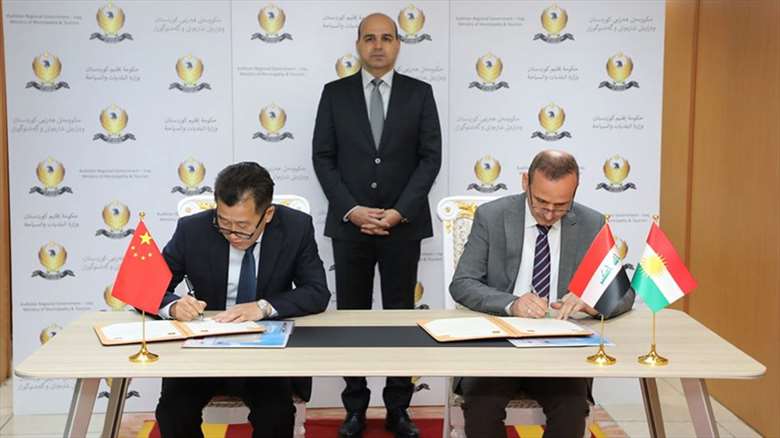China takes further steps to build consulate in the Kurdistan Region

ERBIL (Kurdistan 24) – On Monday, in a ceremony at the Office of Kurdistan Region’s Ministry of Municipalities and Tourism, China and the Kurdistan Region signed an agreement to start the construction of a new Chinese Consulate General in Erbil.
The Ministry of Municipalities and Tourism announced in a statement that the ceremony was held under the supervision of the minister, Sasan Awny. The ceremony included the signing of a document by China’s Consul General Ni Ruchi and the Head of the Erbil Municipality, Abdulwahid Ahmed. The document certified the approval of Kurdish authorities to begin the building of a new facility for China’s Consulate General in Erbil.
The statement explained that the Kurdistan Regional Government (KRG) has provided a section of land on Pirmam Road, in accord with a 2018 agreement to build the Consulate General.
On December 30, 2014, China opened its first Consulate General in Erbil. The ceremony was attended by Chinese Deputy Foreign Minister Zhang Ming and then-Kurdistan Region Prime Minister Nechirvan Barzani.
In recent years, relations between the Kurdistan Region and the People’s Republic of China have developed further in terms of economy and education. Last month, the Kurdistan Regional Government's Ministry of Higher Education and Scientific Research announced the establishment of a Chinese language program at Salahuddin University in Erbil. During the ceremony, the Chinese Consul General confirmed that Peking University would open a Kurdish language department in the near future.
Diplomatic relations between Iraq and China were established on Aug. 25, 1958, following the overthrow of Iraq’s pro-British monarchy the month before. A key alliance, known as the Baghdad Pact, had emerged after World War II—involving Turkey, Iran, Britain, and the US. It was intended to “contain” communism and the leading communist power, the Soviet Union.
The collapse of Iraq’s monarchy, however, meant the demise of the Baghdad Pact, and for the next three decades, Iraq’s ties with the Soviet bloc were closer than its ties with the west.
In the decade following the 1991 Gulf War, Baghdad remained relatively isolated, subject to a strict US economic and political embargo. With the 2003 war that overthrew Saddam Hussein and his regime, Iraq’s isolation ended. Baghdad’s relations, thus, revived with China and other countries.
Following the 1991 war, the Kurdistan Region was also subject to the embargo imposed on the rest of Iraq. However, after Saddam’s overthrow and the end of the US-led embargo, the Kurdistan Region developed the international political and economic ties that it enjoys now. Presently, there are over 30 foreign consulates and representative offices in the Kurdistan Region, and the number continues to grow.
Editing by Laurie Mylroie
